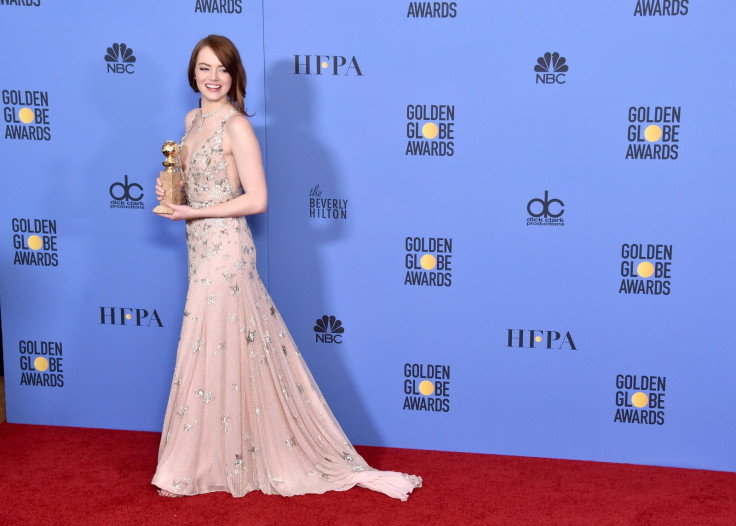Asking an actress about her expensive designer dress isn't sexist
The acting profession loves to take itself seriously, but tuxedos are less interesting than gowns.

Spare a thought for Amber Rudd, the Home Secretary, who not only got her heel caught in between paving stones in Downing Street this week but had to endure it being widely reported, with pictures, as a news story. This trapped heel moment has happened to many of us, but as a leading politician Rudd also had to put up with the indignity of winkling the heel out in front of the cameras. But are such stories really so outrageous? Is this kind of coverage sexist? I think not.
We get too hung up about public figures and their clothes – or rather, they are too hung up about our interest in them. Before Emma Stone won her best actress Golden Globe on Sunday, she was asked by E! presenter Ryan Seacrest what designer she was wearing. Her disdainful response was similar to other actresses who are asked the Dress Question on the red carpet – which three years ago led to the #AskHerMore campaign, claiming the showbiz reporters' questions are sexist. Stone said to Seacrest with a shrug: "Well, it's pink and there are stars on it."
The acting profession loves to take itself seriously, to be regarded as more than just vessels for someone else's words and actions. I can understand how being asked again and again on the same red carpet about something so trivial as fashion might get a little frustrating.
And yet fashion is not trivial – and the Hollywood stars themselves know this. Most of the time, these incredibly beautiful, expensive garments are donated for free by the designer in return for some priceless exposure on the red carpet. It is a core part of where two multi-billion global industries dovetail elegantly in tulle and diamonds, and it is disingenuous to pretend otherwise.
Wouldn't it be more gracious to acknowledge the designer – in Stone's case Valentino – than give a surly response? Asking about something so prominent and part of the awards ceremony performance is not sexist, it does not objectify the actress in question. It is not the same as, for example, when Ariana Grande complained that a fan described her in front of her boyfriend as "sexy as hell" – she was right to feel objectified by such language.
The #AskHerMore campaign was predicated on the fact that reporters do not ask male stars the same question - but they often are, it is just that tuxedos are less interesting than gowns
But if I were Stone, I wouldn't care less about the Dress Question. Instead, I would think how fortunate I was to have won a great role in such a fabulous film as La La Land, how happy I was with my performance that was so perfect that I had been nominated – and was about to win – a Golden Globe and could also enjoy Oscar success, and how I am now wearing a beautiful gown by Valentino. Stone will, rightly, be taken more seriously for her acting achievements than for the way she refuses to say who designed her dress.
The #AskHerMore campaign was predicated on the fact that reporters do not ask male stars the same question – but they often are, it is just that tuxedos are less interesting than gowns. We should not view actors – and male politicians, for that matter – as "lucky" for avoiding such questions about their clothes but regard actresses and female MPs as fortunate that they have a far superior and richly diverse choice of what to wear in front of the cameras. It is not sexist or objectifying, just interesting.
Jane Merrick is a freelance journalist and former political editor of The Independent on Sunday. She writes an allotment blog, www.heroutdoors.uk. Follow : @janemerrick23
© Copyright IBTimes 2024. All rights reserved.






